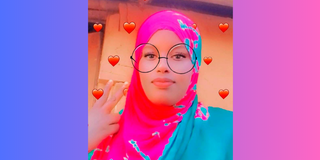Gaala Aden Abdi's 27-day torture before murder exposes our hollow child protection promises

Gaala Aden Abdi, the 17-year-old refugee girl murdered and her body set on fire for refusing to marry a 55-year-old man in Wajir County.
What you need to know:
- Gaala Aden Abdi’s murder highlights Kenya’s femicide crisis, exposing forced marriages, gender-based violence, and the failure of justice systems.
- Outdated cultural practices like the Maslaha system undermine legal justice, enabling impunity for perpetrators of forced marriage and gender-based violence.
Not again!! That was the feeling following news that a 17-year-old Gaala Aden Abdi had been murdered for resisting a forced marriage to a man three times her age. The media reported that the Somali refugee girl was kidnapped under darkness and forcibly transported 150km to Wara Ademasajida in Habaswein for marriage. She was subjected to daily physical brutality, was then murdered after a 27-day ordeal and her body set ablaze.
This nauseous murder breaks Kenya’s Children’s Act, which outlaws marriage of and sexual intercourse with anyone below 18 years of age. It also breaches Kenya’s Counter-Trafficking in Persons Act, which defines human trafficking as “the recruitment, transportation, transfer, harbouring, or receipt of persons through means such as force, fraud, deception, or coercion for purposes of exploitation”.
Article 6 of the Protocol to the African Charter on Human and People’s Rights prescribes 18 as the minimum age of marriage, hence prohibits the purported marriage of Gaala. It also states that all marriages must be out of free and full consent of both parties. This echoes Article 16 of the Convention on the Elimination of All Forms of Discrimination against Women.
Moreover, the United Nations Convention on the Rights of the Child protects children from harmful traditional practices such as forced marriages. Article 24 calls on states parties to abolish them. Article 28 guarantees the child theright to education, which gets negated by such marriage. And Article 34 addressessexual exploitation, an automatic consequence of forced and child marriages.
Gaala’s case illustrates violation of the four principles of child rights. The best interest of the child requires that children be treated as having special needs and interests by virtue of their tender age, psychological immaturity and social status of dependency. Gaala did not ask to be married. Even if she did, it was not in her best interest. In Kenyan law, she had no capacity to consent to a marriage. Child marriages result in deleterious physical, psychological and social effects related to pregnancies, parental and spousal responsibilities, high parity and maternal mortality.
The principle of the right to life, survival and development was egregiously flouted as Gaala’s life was cut short. All her hopes of education, career and other prospects were extinguished. The principle of non-discrimination arises considering that Gaala was probably targeted because she was a refugee, a vulnerable entity.
Read more: Why I chose marriage at 16
The principle of respecting the views of the child requiresexpression of their views on matters that affect them and consideration of the same in accordance with their ages and levels of maturity. Gaala’s opinion was ignored. Even if Gaala were an adult, her consent was required.
The physical and psychological brutality Gaala was exposed to fits the text book definition of torture, and what human rights discourse describes as cruel, inhuman and degrading treatment. This is treatment that no human being should be subjected to under any circumstance because it robs the person of dignity, the foundation of all human rights. Gaala was physically imprisoned, violating her right to free movement and association.
Most disgusting are reports that the perpetrators have activated the “Maslaha” system, a traditional mechanism through which parties settle matters out of court. Such traditional systems of “justice” are often biased, circumvent the law and deny the direct and indirect victims of crime the justice they deserve. No amount of financial and material compensation can replace Gaala’s life. Such a system should not be allowed to operate in civilised society as it only emboldens criminals and entrenches impunity. Community elders who officiate these processes to compromise justice should themselves be apprehended, prosecuted, fined and jailed.
The media reports indicate that Gaala sent to her mother (and stepfather presumably) daily records of her ordeal, including the imminent danger she was in of losing her life. There is no indication that they took any action. This is captured in Gaala’s words that “no one wants to listen to me”. This means there was a chance to save Gaala’s life. But her cries went unanswered. Can there be anything more insane and inhuman than this? Was there parental collusion in this unfortunate saga?
Gaala’s is “murder most foul”, to quote Shakespeare’s play Hamlet. It is the ultimate form of gender-based violence, straddling all its forms – sexual, physical, cultural, economic and psychological.
Failure to speedily arrest, prosecute and penalise the perpetrators of this crime would be a loud statement on the value the government places on women’s and girls’ lives. Most critical is to eradicate these outdated cultural practices and compromised traditional justice systems that excuse and reward crime. As stated by the National Gender and Equality Commission, echoing Joe Sutton’s play, enough is enough.
The writer is a lecturer in Gender and Development Studies at South Eastern Kenya ([email protected]).





